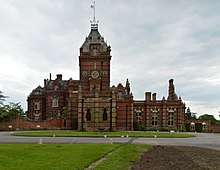Elvetham Hall
Elvetham Hall is a High Victorian Gothic style English country house in the parish of Hartley Wintney, Hampshire. It is a Grade II* listed building.[1]

It was built in 1859–1862 to the design of architect Samuel Sanders Teulon, who was noted for his polychrome brickwork, and therefore not unnaturally constructed of red brick and stone dressing, with bands and decoration in black brick. An ornate design, it has hipped and mansard roofs with gables and dormers, tall brick chimney-stacks and an entrance front dominated by a tall tower. The interior is remarkable for its fireplaces. The architectural historian Mark Girouard described Elvetham as "the holiest or unholiest of zebras, being not only striped, but also zigzagged and diapered all over with bricks, and slates of different colours... like an enormous multi-coloured jelly".[2]
History
The 300 acre Elvetham estate was established by Sir William Sturmy in 1403 after inheriting the possessions of his uncle Sir Henry Sturmy in 1381. He died there in 1427 and the estate, along with his main seat at Wolfhall in Wiltshire, passed to his son-in-law John Seymour. It passed down in the Seymour family and was visited by Queen Elizabeth I, who planted an oak tree that still stands in the park.
The estate passed to the Calthorpe family in the middle of the 17th century. The original manor house finally burnt down in 1840. [3] Frederick Gough, 4th Baron Calthorpe inherited the estate in 1851 and died there in 1868, after which it passed in turn to his sons Frederick Gough-Calthorpe, 5th Baron Calthorpe and Augustus Gough-Calthorpe, 6th Baron Calthorpe. The latter established in 1900 what has become a noted herd of shorthorn cattle. His Southdown sheep and Berkshire pigs were also famous.
In 1953, the Hall and gardens were sold to ICI, then to Lansing Bagnall of Basingstoke. The gardens were restored in 1962 when a croquet lawn and tennis courts were laid out and are separately Grade II listed.[4] The hall was run as a conference centre in the 1960s but is now an hotel. [5]
References
- Historic England. "Elvetham Hall House (1092322)". National Heritage List for England. Retrieved 19 February 2019.
- Physick & Darby 1973, p. 62.
- "Elvetham Hall History". Hampshire History. Retrieved 19 February 2019.
- Historic England. "Elvetham Hall (1000250)". National Heritage List for England. Retrieved 19 February 2019.
- "Elvetham (Historic England)". Hampshire Gardens. Retrieved 19 February 2019.
Sources
- Physick, John; Darby, Michael (1973). Marble Halls - Drawings and Models of Victorian Secular Buildings. Margate, Kent: Eyre and Spottiswoode Ltd. ISBN 978-0-90148-6684.